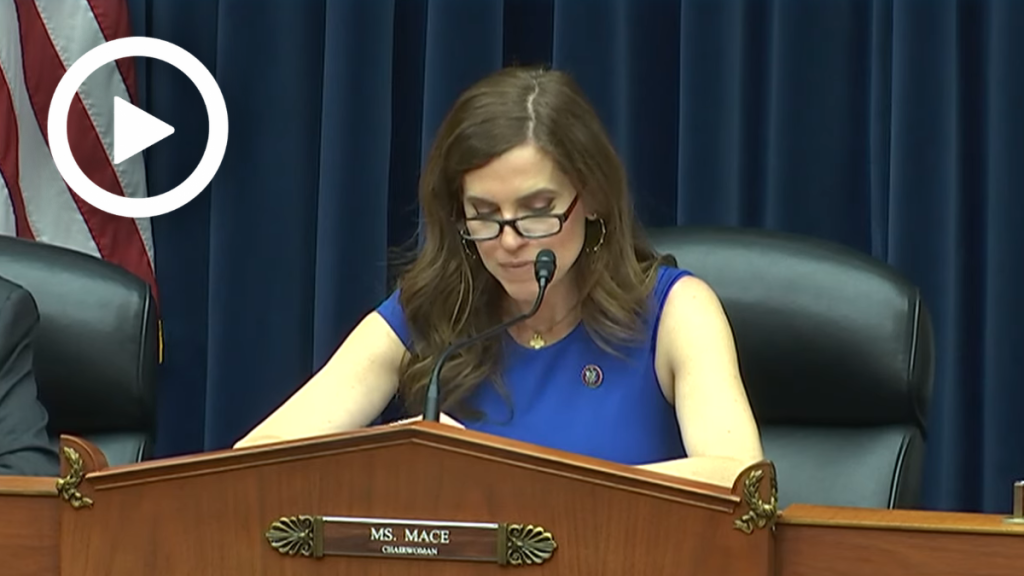Mace Opens Hearing on AI-Ready Workforce
WASHINGTON – Subcommittee on Cybersecurity, Information Technology, and Government Innovation Chairwoman Nancy Mace (R-S.C.) delivered opening remarks at a subcommittee hearing titled “Toward an AI-Ready Workforce.”In her opening statement, Subcommittee Chairwoman Mace emphasized how maintaining America’s edge in AI is key to our continued national security and economic prosperity.
Below are Subcommittee Chairwoman Mace’s remarks as prepared for delivery.
Good afternoon and welcome to this hearing of the Subcommittee on Cybersecurity, Information Technology and Government Innovation.
Today, America is indisputably the global leader in artificial intelligence.
This Nation has led the way on AI during its “lift-off” stage. American companies and institutions have developed the most sophisticated AI models – like Chat GPT.
American companies, universities and research institutes are producing the bulk of the cutting-edge research that’s pushing forward the frontiers of knowledge in the field.
Going forward, maintaining America’s edge in AI will be a key to our continued national security and economic prosperity.
But we can’t take that lead for granted.
We’re now entering a stage of widespread AI adoption, according to many business leaders. AI technologies will be integrated into the economy, both here and abroad.
Nearly three-quarters of companies surveyed for last May’s World Economic Forum Future of Jobs Report said they are highly likely to adopt AI over the next five years. They expect AI to create a lot of job churn, but to ultimately lead to a 25 percent net increase in jobs. That’s why they also identified AI and big data as among their top priorities for workforce upskilling.
That means, going forward, keeping our global edge in AI will increasingly depend on the global competitiveness of a broader American AI workforce.
We will still need to have the best computer scientists and software engineers – that Future of Jobs report found AI and machine learning experts are projected to be among the fastest-growing jobs. But we will also need to fill a much broader pool of AI-related work roles requiring various skill sets.
There will be opportunities for both new workforce entrants and employees looking to retool and upskill.
But this transition will also test our training pipeline.
And America’s pipeline in the STEM fields is a concern. Take cybersecurity, which is also critical to our national and economic security.
We have a shortage of 700,000 cybersecurity workers across the private and public sectors. Why? We know that our traditional education system doesn’t produce nearly enough degreed graduates in the field to fill the need.
We also know that that shortfall would be much worse if not for the appearance of nimble educational alternatives. That includes short-term “boot camp” programs that issue non-degree credentials like certifications and badges.
Our witnesses will testify about how these sorts of flexible, targeted programs are being used to train young people for AI-related roles and upskill older workers.
We know that China is making a multi-pronged push to lead in AI talent. They have been trying – largely without success – to lure back home Chinese nationals graduating from top U.S. computer science programs. But they domestically produce many more STEM grads than we do.
And the Chinese Ministry of Education has approved in recent years hundreds of new university AI programs, according to Georgetown University’s Center for Security and Emerging Technology, which also found that AI is the most popular new major in China.
Before I yield, I want to speak to the federal workforce. It’s critical the federal government have an appropriate AI workforce. I have a bill the Committee reported last year that requires federal managers to be trained on AI, so the Government can deploy it wisely.
We had the Defense Department’s Chief AI officer testify before this subcommittee, and it’s clear DoD is at least making progress in this space. But the Office of Personnel Management is another story. It was tasked three years ago by Congress with identifying AI talent gaps across the federal civilian AI workforce, and with creating a new AI job series for federal workers. It has done neither. We’re still waiting.
With that, I will now yield to Ranking Member Connolly for his opening statement.
